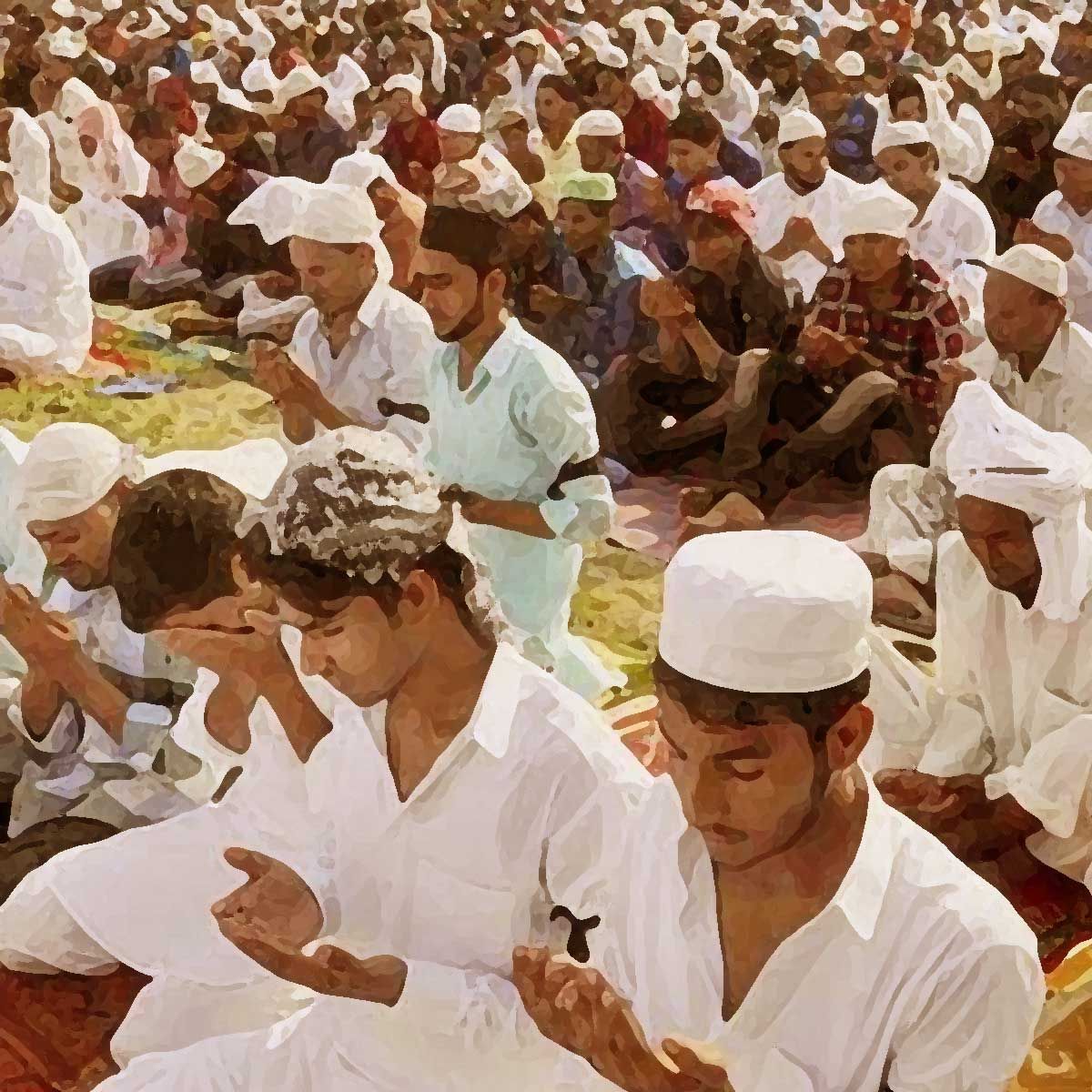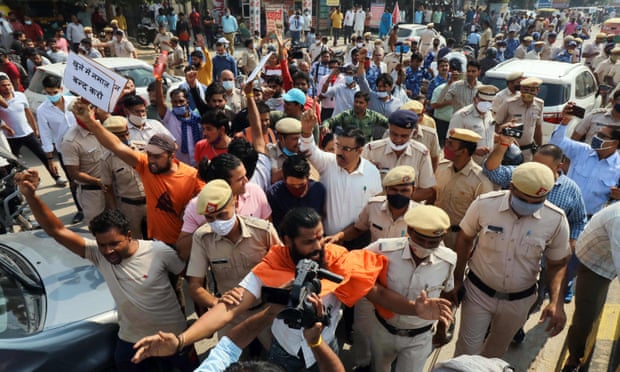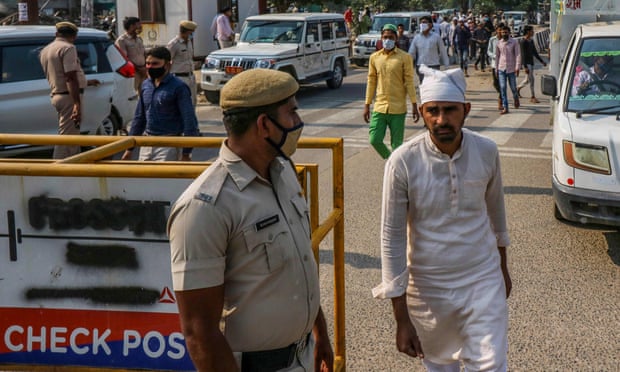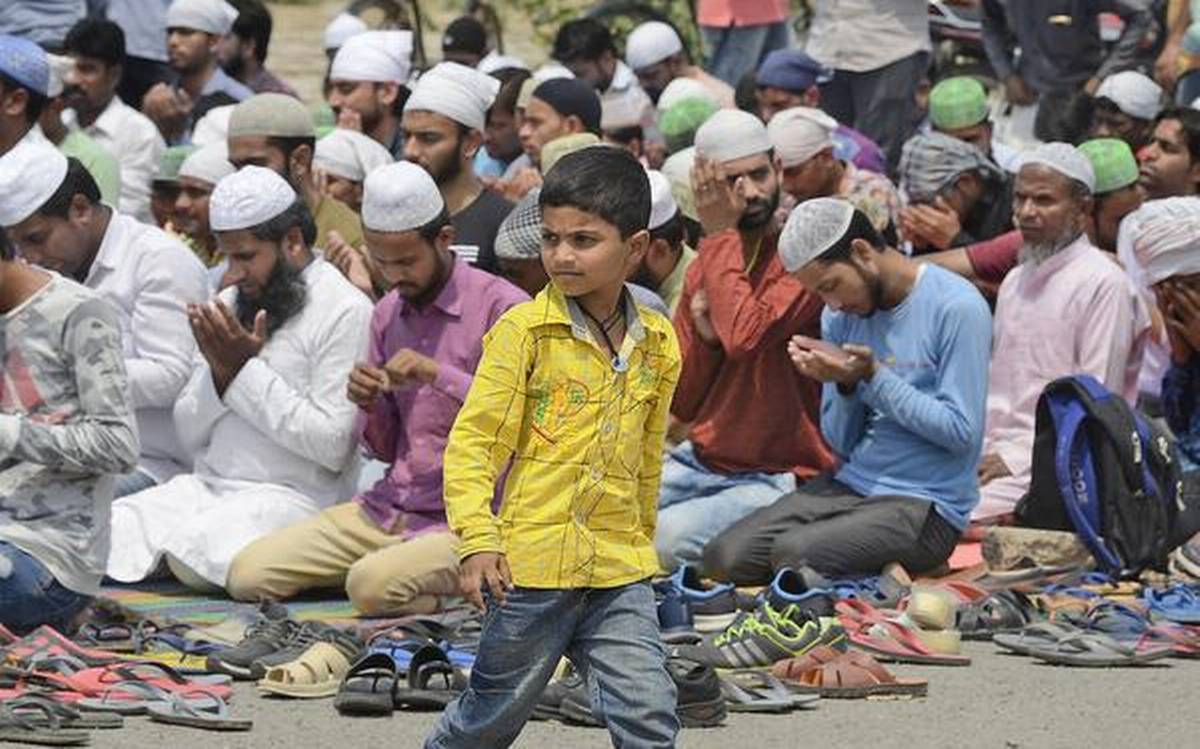MORE COVERAGE
Twitter Coverage
Satyaagrah
Written on
Satyaagrah
Written on
Satyaagrah
Written on
Satyaagrah
Written on
Satyaagrah
Written on
JOIN SATYAAGRAH SOCIAL MEDIA
Public grounds in Gurugram are ‘Muslim sites’ as per Guardian: Muslims have right to offer namaz at those places

While residents in Gurugram are protesting against Muslims occupying public places every week for namaz prayers, Guardian has claimed that those public places are Muslim sites, and the Muslims in India have no place for praying now.
In an article titled ‘New city, old schism: Hindu groups target Gurgaon’s Muslim prayer sites’, the report by Hannah Ellis-Petersen claimed that just because Muslims are using open grounds like car parks for weekly prayers, they are ‘Muslim sites’ now, and they now have right over those places. It also equated Gurugram public space to fictional religious battlefields.
 Police standing guard in Gurgaon, India, to secure the site of Friday prayers amid protests by Hindu groups in October. Photograph: Manoj Kumar/AFP/Getty |
As per the report, the author has stated that since a car park in Gurugram was used as a temporary prayer site for decades by the Muslims, the car park can be conveniently termed as a prayer site.
|
The author tried to paint the residents of Gurugram and Hindu activists as villains for protesting against illegal occupation of public places every week, and the Muslims became the victims in the article. The author claims that “for the Muslim community, praying in the few public sites they have left has become a statement about their rights in society,” implying that Muslims can offer prayers in open grounds only. The article claims that since there are not adequate mosques in the area for all Muslims to offer Friday namaz, they are forced to use public places, and now they are being prevented from doing so.
In the last few weeks, several left-liberals have been making this argument, saying that Muslims have to use public ground because there are not enough mosques for all of them. But the fact is that, not a single religion has religious places that fit all the adherents of that religion at the same time. No place have enough temples, churches or gurudwaras where all Hindus, Christians or Sikhs can pray at the same time.
It is being assumed by Guardian and other left-liberals and Islamists that Muslims have to pray in the open only. But many people argue that if they don’t have enough mosques, they can pray at their homes or workplaces, as blocking roads and other public places cause huge inconvenience to general public.
Guardian justifying namaz in open public spaces
The thousands of Muslim labourers who have flocked to this expanding metropolis for construction work on Gurgaon’s corporate skyscrapers and luxury high-rise apartments found another option. Unable to travel for miles to a mosque to offer namaz, they began praying on empty patches of land. They even sought permission from the administration and by 2018 the Muslim community had been granted permission for outdoor prayers in 108 places across the district.
“People are forced to pray out in the open because we have no other choice,” said Altaf Ahmad, a co-founder of the Gurgaon Muslim council.
 Police stand guard as devotees walk to offer Friday prayers in Gurgaon. Photograph: Manoj Kumar/AFP/Getty |
But in 2018, rumblings of discontent began, as Hindu vigilante groups realised that Muslims were praying on public land. They began to hold protests, sometimes with more than 100 people, disrupting dozens of Friday prayers and fracturing the modern metropolis along an age-old schism.
In response, the Gurgaon administration reduced the number of namaz sites from 108 to 37, to the dismay of the Muslim leaders who felt the administration was bowing to the demands of fanatics. “They told us it was temporary and just to cool the situation down,” said Ahmad. But this year, after a lull due to Covid, the objections came back with a vengeance.
Every Friday for months, members of Hindu vigilante groups alongside local residents have been gathering, occasionally armed with axes and wooden rods, at the sites of namaz to try to stop them happening. Slogans including “shoot the traitors” have been shouted and Hindu prayers and songs read out to try to drown out Qur’an readings. Cow dung has been placed at the sites and police have regularly had to hold back the mob so namaz could continue.
Last month an umbrella organistion of Hindu groups called the Sanyukt Hindu Sangharsh Samiti told police that they were ready to use weapons and go to jail if the namaz was not stopped.
At the forefront of the fight is Dinesh Thakur, who goes by the name Dinesh Bharti, a nod to his devotion to Bharat, meaning mother India. Thakur, who has set up his own one-man Hindu nationalist army called Bharat Mata Vahini, has been detained more than 10 times and arrested and charged three times for his communal actions.
On Friday Thakur sprinted towards Shehzad Khan, the Muslim leader who was there to lead the prayer, and began confronting him, getting within inches of his face shouting “no namaz here”, until he was dragged away by five police officers. As the Muslims filed silently into the area for namaz, heads down and clutching their prayer mats, a line of armed police held back the Hindu nationalist mob. Seven were detained by police.
“Conducting namaz in the open is land jihad,” Thakur said before being arrested. “It’s an international conspiracy. They do namaz outside, then they build a shrine, then they build a mosque and then inside the mosque they are harbouring terrorists and weapons and they are a threat to the nation. I will not stop my fight until this becomes illegal.”
Residents have joined the protests, including Ravinder Kumar, 45, a software engineer and joint secretary of Gurgaon’s sector 47 residents’ welfare association. “So many unknown people were coming here for namaz, and it created an environment of fear,” said Kumar. “Afterwards they wander into our park, and we are worried they could be here for theft. A few days ago an AK47 rifle was seized from a Muslim in Gurgaon by police. We don’t want such things in our area.”
 |
Netizens slammed Guardian for naming public spaces in Gurugram as prayer sites :
Netizens slammed Guardian for labelling public places Muslim sites, and questioned their intention behind the article.
|
Sumit Agrawal said, “Seriously? Muslim sites? They are calling public properties ‘muslim sites’…. This is the exact reason why we must stand against such takeover of public properties.”
|
Entrepreneur Ram said, “This is such a garbage piece on so many levels. Public property is not a Muslim site. It is not the state’s responsibility to build a place of worship. Hindu groups are not laying claim on these sites for themselves. But this is the Guardian of bigotry & fake news.”
|
Tapashish Chakraborty notes, “The @guardian brings forth a most important caveat for non-Muslims. Stand firm against the slightest encroachment by Muslims or even the most public of your places like roads & parks will soon become “Muslim sites”.
|
Aabhas Maldahiyar @Aabhas24 replying to @guardian said: "Stop lying! That’s public space on which people are opposing Namaz. Truth is that in Gurugram Waqf board has 233 acres land which by calculation of 9 sqft/ Muslim can give space to 28-30 times Muslim Population that lives in Gurugram but no one asks Waqf!"
Similarly, many Twitters reminded Guardian that people are protesting against blocking of public spaces, and they are not Muslim sites.
|
|
|
References:
opindia.com - OpIndia Staff
theguardian.com - Hannah Ellis-Petersen in Gurgaon
 Support Us
Support Us
Satyagraha was born from the heart of our land, with an undying aim to unveil the true essence of Bharat. It seeks to illuminate the hidden tales of our valiant freedom fighters and the rich chronicles that haven't yet sung their complete melody in the mainstream.
While platforms like NDTV and 'The Wire' effortlessly garner funds under the banner of safeguarding democracy, we at Satyagraha walk a different path. Our strength and resonance come from you. In this journey to weave a stronger Bharat, every little contribution amplifies our voice. Let's come together, contribute as you can, and champion the true spirit of our nation.
 |  |  |
| ICICI Bank of Satyaagrah | Razorpay Bank of Satyaagrah | PayPal Bank of Satyaagrah - For International Payments |
If all above doesn't work, then try the LINK below:
Please share the article on other platforms
DISCLAIMER: The author is solely responsible for the views expressed in this article. The author carries the responsibility for citing and/or licensing of images utilized within the text. The website also frequently uses non-commercial images for representational purposes only in line with the article. We are not responsible for the authenticity of such images. If some images have a copyright issue, we request the person/entity to contact us at This email address is being protected from spambots. You need JavaScript enabled to view it. and we will take the necessary actions to resolve the issue.
Related Articles
- Twitter rewards an Islamist org, set to be banned by India, with a verified blue tick: Here is what PFI has done in the past
- Leftist culture of abuse and targeted attacks: Journalists and entertainers had to face Islamist harassment
- Ghaziabad: Samajwadi leader Umed Idris booked for giving false communal twist to assault incident, making victim lie about case
- Supreme Court dismisses plea seeking protection of Hindus from the Muslim community in Mewat
- "Hinduon ke beech me khade hoke namaaz padi, that was very very special for me" - Waqar Younis takes Jihadist mindset of another level
- 130 attackers arrested in Noakhali, Bangladesh for violence against Hindus: So far out of thousands unnamed Islamists booked
- Google removes ‘Ghazwa e Hind’ app from play store after uproar
- The ‘Sanghi propaganda’ trope on abduction and conversion of Sikh girls to Islam. Here is how this online tirade is an omen of impending danger
- Only Dhimmis can be a good Hindu – An article on Shekhar Gupta’s ThePrint argues ‘defending namaz’
- Aatish Taseer shows how his ‘jamaat’ has mastery over playing victim, brands Bollywood pro-Modi even as it remains anti-Hindu
- Bizarre argument by Alt News in defense of Muslim man ‘spitting on food’ in viral video
- Land Jihad being carried out by Waqf Board much more dangerous than Love Jihad; Hindus need to fight this
- Here is a list of 20 incidents where the ‘Jai Shri Ram’ slogan has been misused to turn a random crime into ‘hate crime’
- ‘State in denial, admin lied about no complaints being filed, prima facie evidence of violence’: Everything Calcutta HC said on Bengal post-poll violence
- Aurangzeb banned Diwali 350 years ago, Courts and governments are just following Mughal ruler



























